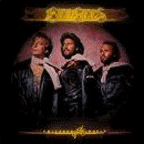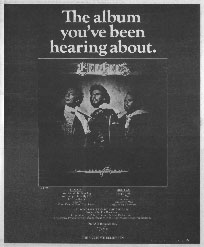![]()
  |

Children of the World
Bee Gees
RSO 3003
Released: September 1976
Chart Peak: #8
Weeks Charted: 63
Certified Platinum: 12/23/76
From mushy pop ballads through late-Sixties psychedelia and low-key rock, the Bee Gees have demonstrated a chameleonlike ability to adapt to disparate pap trends. These days, as they said on the Tonight Show in their best Cockney accents, "Rhythm & blues is what's happening." Audacious, right? Well, not exactly. Some of their stuff is really good, better than poseurs like Wild Cherry, AWB and Kokomo.
 Click image for larger view. |
The overwhelming success and acceptance (by blacks and whites) of white bands working in black idioms must have some underlying social significance. Don't aske me what it is. I just dance to the music.
- Joe McEwen, Rolling Stone, 11/4/76.
Bonus Reviews!
The Bee Gees have turned themselves into a disco band. I assume that means either that their attention span has become fragmented and spasm-wracked the way their music (pardon the expression) has, or they think your attention span has gone bust. There are those who claim a steady diet of television can do that to a race. And then there is this new vocabulary around now that has to do with how the right hemisphere of the brain, which handles the hunches, intuition, instantaneous, nonlinear, and unwordable concepts, etc., is taking over in Western man from the left half where logic and empirical thinking reside. Or you can fit an album like this into a slightly messy thesis tying disco to Marshall McLuhan. So go ahead -- I'd much rather hear the thesis than this album. I doubt if anyone is supposed to listen to it; it seems to be Muzak for the feet, and not happy feet either, but bored feet, jaded feet. Make pop music this impersonal -- particularly if you're a band with a strong reputation for nice old harmonized schlock -- and the word in it about love, or anything else human, are a travesty. This is my idea of decadence, which is boring. Beyond that, the Gibb brothers have snatched up a style that has no use for the mostly melodic special gifts they have. I've seldom seen a group work so hard at throwing away its uniqueness.
- Noel Coppage, Stereo Review, 1/77.
After some years of disappointment, as one good record after another failed to reach its potential market, the Bee Gees found that Number One single formula again by absorbing many of the hooks of the exploding disco music into its richly textured style. Now with the Bee Gees label, RSO, leaving Atlantic to go independent, this is the Brothers Gibb first recent LP without Arif Mardin, who produced their comeback sides. On their own, the Bee Gees have lovingly reproduced and even further refined the blue-eyed disco sound it developed with Mardin. Lead vocalist Robin Gibb has deserted his distinctive vibrato for a pure falsetto that could be easily at home in the O'Jays or the Stylistics. Brothers Maurice and Barry provide lead instrumentals and vocal harmonies that also out-soul all but the best of contemporary soul groups. The Bee Gees have had the determination and good fortune to create for themselves a second style that caught the public imagination as much as the group's earlier hits. Best cuts: "You Should Be Dancing," "Love So Right," "Lovers," "You Stepped Into My Life."
- Billboard, 1976.
Their closed-system commitment to a robot aura renders embarrassing questions about whether they mean what they're singing irrelevant, which is good. Too often, though, their pleasure in artifice doesn't wholly irradiate the rather patchy material. Best hook: Blue Weaver's organ part on "Subway." B
- Robert Christgau, Christgau's Record Guide, 1981.
The Bee Gees were well on their way to earning the Disco Kings crown that would haunt them for the rest of their career when they recorded this disc, which found the kings of pop harmony self-producing and Barry Gibb experimenting with the falsetto that would mark a change in their singing style. Great vocal interplay and gritty soul combine for fun party hits, so get up on your feet, boogie child, 'cause you should be dancing. * * * *
- Zagat Survey Music Guide - 1,000 Top Albums of All Time, 2003.
![]() Reader's Comments
Reader's Comments
No comments so far, be the first to comment.